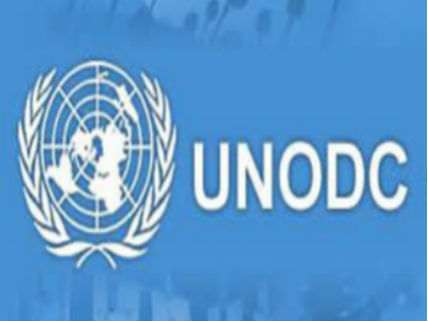Leaked U.N. Document Highlights Drug War Dissent

An internal U.N. document leaked to The Guardian offers a rare glimpse of disagreement about drug policy among member states, several of which are advocating a less violent approach. The document, a draft of a policy statement scheduled to be released next spring, suggests a breakdown in the international consensus supporting the forcible suppression of politically disfavored pharmacological tastes:
Ecuador is pushing the UN to include a statement that recognises that the world needs to look beyond prohibition. Its submission claims there is "a need for more effective results in addressing the world drug problem" that will encourage "deliberations on different approaches that could be more efficient and effective."
Venezuela is pushing for the draft to include a new understanding of "the economic implications of the current dominating health and law enforcement approach in tackling the world drug problem", arguing that the current policy fails to recognise the "dynamics of the drug criminal market."…
Norway wants the draft to pose "questions related to decriminalisation and a critical assessment of the approach represented by the so-called war on drugs." Switzerland wants the draft to recognise the consequences of the current policy on public health issues. It wants it to include the observation that member states "note with concern that consumption prevalence has not been reduced significantly and that the consumption of new psychoactive substances has increased in most regions of the world." It also wants the draft to "express concern that according to UNAids, the UN programme on HIV/Aids, the global goal of reducing HIV infections among people who inject drugs by 50% by 2015 will not be reached, and that drug-related transmission is driving the expansion of the epidemic in many countries."
The EU is also pushing hard for the draft to emphasise the need for drug-dependence treatment and care options for offenders as an alternative to incarceration.
"Drug users should be entitled to access to treatment, essential medicines, care and related support services," the EU's submission suggests. "Programmes related to recovery and social reintegration should also be encouraged."
With the exception of Ecuador, this is pretty mild stuff, especially at a time when former presidents of Latin American countries have publicly called for an end to the war on drugs and two U.S. states, along with Uruguay, have taken a big step in that direction by legalizing marijuana. But in the context of U.N. policy statements, which are usually organized around mindless mantras like "A Drug-Free World by 2000," these deviations from prohibitionist orthodoxy seem almost radical.
"The idea that there is a global consensus on drugs policy is fake," Damon Barrett, deputy director of Harm Reduction International, tells The Guardian. "The differences have been there for a long time, but you rarely get to see them. It all gets whittled down to the lowest common denominator, when all you see is agreement. But it's interesting to see now what they are arguing about."
Editor's Note: As of February 29, 2024, commenting privileges on reason.com posts are limited to Reason Plus subscribers. Past commenters are grandfathered in for a temporary period. Subscribe here to preserve your ability to comment. Your Reason Plus subscription also gives you an ad-free version of reason.com, along with full access to the digital edition and archives of Reason magazine. We request that comments be civil and on-topic. We do not moderate or assume any responsibility for comments, which are owned by the readers who post them. Comments do not represent the views of reason.com or Reason Foundation. We reserve the right to delete any comment and ban commenters for any reason at any time. Comments may only be edited within 5 minutes of posting. Report abuses.
Please to post comments


CONSENSUS!!!!!11!!1!!1
If there's anything that my incarceration in the public school system has taught me; it's that in order for a belief to enter the realm of fact, a majority of arbitrarily grouped people need to believe it's a fact.
Nice try, UN, to get me to think that MAYBE you have some redeeming quality.
You don't. But - nice try.
Well, it's not the UN. It's several of the states that belong to the UN.
So not to worry; the UN will continue to lack any reason for existence.
Well, since it was "Ecuador appealed to the UN...", "An internal UN document said..." - close enough for international agency work.
It would help if governments recognized that not all drug use constitutes a "problem", even for the users themselves.
And it would help if the governments in question told the UN that the UN can do any damn thing it pleases, but we aren't going to enforce your rules.
Somewhat heartening, I suppose, but thank you, no. No, I'm afraid that doesn't suffice.
FUCK YOU, I say. DECRIMINALIZE IT.
Fuck the UN
Fuck the UN
Venezuela ..."dynamics of the drug criminal market."...
Another moment out of Atlas Shrugged. A marxist insipired gubmint shows more understanding of market forces than the US gubmint.
We are so screwed.
Not decriminalize, legalize, you fools cant legislate morality. the arrogance exhibited by this group of fools (the UN) is exhausting. where was the un after 9/11?, after Lybian bombing of the marine base?, after saddam husseins mass genocide? no? no UN? Face it the UN is a dead horse we need to cut our losses and GTFO, not like its remotely beneficial for Americans to pay 22% of the world tab and receive none of the benefits. Let America stay free and stop outsourcing government policy to people who have never had freedoms to be stolen in the first place.
Really everytime I see a UN flag I want to punch someone, its a disgrace to the constitution